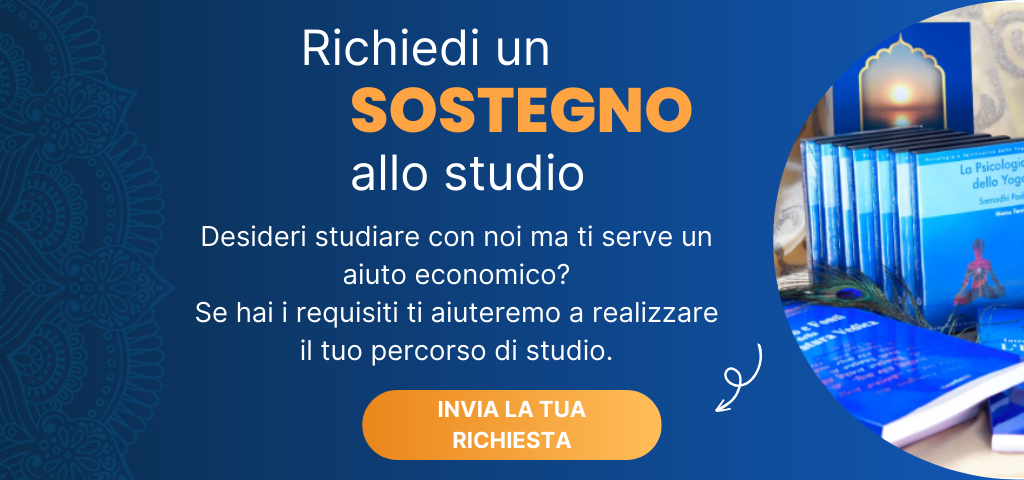Yoga and Science of Relations

Human relationships are the greatest asset you have. Know yourself to better know others, life, Love.
Loyalty is the greatest quality in a relationship.
Those who lack loyalty, even when they seem to be making progress on a material level, actually destroy far more than they build.
Marco Ferrini

Good relationships are the greatest wealth that one can build in the field of wellness, at no cost. To experience them peacefully, without tensions, is the basis to construct relations of increasingly higher level, capable of lasting and oriented towards growth.
The course helps you to understand the subtle relational dynamics, evaluate the weak and the strength points, find solutions to problems, solve conflicts, establish the right empathy, acquiring the capability of creating fulfilling and evolutional relationships.
The course helps you to understand the subtle relational dynamics, evaluate the weak and the strength points, find solutions to problems, solve conflicts, establish the right empathy, acquiring the capability of creating fulfilling and evolutional relationships.

To learn how to know oneself and others in depth, bring harmony to relationships, within couples, families, among friends and to the workplace.
To acquire useful knowledge in order to manage thoughts, feelings and emotions; to recognise the undisclosed needs and desires that lie at their roots and become capable of harmonising them; to develop real success in every relationship and in life.
To acquire useful knowledge in order to manage thoughts, feelings and emotions; to recognise the undisclosed needs and desires that lie at their roots and become capable of harmonising them; to develop real success in every relationship and in life.

4 EDUCATIONAL LEVELS
More than 90 subjects available

INTRODUCTORY

IN-DEPTH

ADVANCED
+

MASTER
+

STUDY FROM HOME
Studying from home allows you to:
● Save time and money, avoiding commuting and stays away from home.
● Realise a “dream”, without subtracting time to work commitments.
●
Plan according to your needs and availability.

TUTORING
Study with a tutor taking into account the personal study rhythms.
Tutoring via Skype, webcam, in person at the CSB Campus in Ponsacco (Tuscany), in your city or during the CSB seminars.
Tutoring via Skype, webcam, in person at the CSB Campus in Ponsacco (Tuscany), in your city or during the CSB seminars.

RECOGNISED CREDITS
Educational titles, cultural, professional and social experiences, university exams already attained may be recognized on the basis of the individual curriculum vitae.
For each course level:
-
 Exclusive books
Exclusive books -
 Audios e videos
Audios e videos -
 Live streaming and on-demand classes
Live streaming and on-demand classes -
 Tutor assistance
Tutor assistance -
 Mind-maps
Mind-maps -
 Guided practice sessions
Guided practice sessions -
 Private Online Space
Private Online Space -
 Experiential and residential seminars in Italy and India (optional)
Experiential and residential seminars in Italy and India (optional) -
 In-depth workshops with our teachers
In-depth workshops with our teachers -
 Exam preparation
Exam preparation -
 Online exams (with written and oral test)
Online exams (with written and oral test) -
 Exams (with written and oral test) at the CSB Campus or during the seminars
Exams (with written and oral test) at the CSB Campus or during the seminars -
 Certificate of completion
Certificate of completion

ASK FOR MORE INFORMATION

SUBJECTS
INTRODUCTORY COURSE:
3 basic subjects
3 basic subjects
-
 Compared Psychological Models
Compared Psychological Models
India and the West -
 Psychology and Philosophy of the Bhagavad-Gita
Psychology and Philosophy of the Bhagavad-Gita -
 Samkhya Psychology and Philosophy
Samkhya Psychology and Philosophy
Mankind and the Universe
IN-DEPTH COURSE:
6 basic subjects
6 basic subjects
-
 Compared Psychological Models
Compared Psychological Models
India and the West -
 Psychology and Philosophy of the Bhagavad-Gita
Psychology and Philosophy of the Bhagavad-Gita -
 Samkhya Psychology and Philosophy
Samkhya Psychology and Philosophy
Mankind and the Universe -
 Yoga Psychology I
Yoga Psychology I
Samadhi Pada: How to Realise Oneself -
 Yoga Psychology II
Yoga Psychology II
Sadhana Pada:The Value of Spiritual Practice -
 The Role of Will in the Transformation of the Unconscious and in the Development of Deficient Faculties
The Role of Will in the Transformation of the Unconscious and in the Development of Deficient Faculties
ADVANCED LEVEL:
9 basic subjects + 1 subject choice
9 basic subjects + 1 subject choice
-
 Compared Psychological Models
Compared Psychological Models
India and the West -
 Psychology and Philosophy of the Bhagavad-Gita
Psychology and Philosophy of the Bhagavad-Gita -
 Samkhya Psychology and Philosophy
Samkhya Psychology and Philosophy
Mankind and the Universe -
 Yoga Psychology I
Yoga Psychology I
Samadhi Pada: How to Realise Oneself -
 Yoga Psychology II
Yoga Psychology II
Sadhana Pada: The Value of Spiritual Practice -
 The Role of Will in the Transformation of the Unconscious and in the Development of Deficient Faculties
The Role of Will in the Transformation of the Unconscious and in the Development of Deficient Faculties -
 Karmic Affinities and Emotional Relationships
Karmic Affinities and Emotional Relationships -
 Betrayal, Love, and Forgiveness
Betrayal, Love, and Forgiveness -
 From Eros to Love
From Eros to Love
Study subject choices
- From Eros to Love
- Karmic Affinities and Emotional Relationships
- Betrayal, Grudge and Forgiveness
- Art as Yoga Between India and the West
- The Art of Listening Sound and Psyche
- Myths and Symbols in the Indo-Vedic Civilisation
- Ethics and Aesthetics
- Fundamentals of Vastu Architecture Science and Art of Living Space
- The Universe within Architecture Practical application of Vastu
- History of the Indo-Vedic Civilisation
- Indo-Vedic Archaeology
- History of Indo-Vedic Art
- Theories and Methodologies for Holistic Health
- Fundamentals of Ayurveda
- Ayurveda and the Mind
- Yoga e Ayurveda
- Science of Nutrition Introductory Elements
- Science of Nutrition in Ayurveda
- Ayurveda e la scienza dell’autoguarigione
- Ayurveda and Pancakarma
- Fundamentals of Yoga-therapy
- Theory and Practice of Meditatione
- Fundamentals of Mantra-therapy
- Theory and Practice of Yoga Neurofeedback
- Yoga and Holistic Health
- Thoughts, Emotions and Realisations
- Physiology of Emotions Yoga Science and Art of Communication and Relationships
- Vairagya – Ontology of Emotions Origins and Nature of Emotions
- Emotional Development of Emotions
- Emotional Training
- Bioenergetics of Emotions
- Asana and Pranayama For the Harmonisation of Emotions
- Context and Sources of Vedic Literature
- Dante’s Journey and the Bhagavad-Gita Psychological Experiences of Hell, Purgatory and Paradise for Contemporary Mankind e Paradiso per l’uomo contemporaneo
- Introduction to the Bhagavad-Gita Divinity, Humanity and Nature
- Bhagavad-gita I The vision and Promise of Love
- Bhagavad-gita II Wisdom and Love: The Yoga of Acting
- Bhagavad-gita III Faith that Thinks, Acts and Loves
- Bhagavad-gita IV ourney for the Discovery of Happiness
- Bhagavad-gita V Metaphors of Life and Development of Spiritual Vision
- Bhagavad-gita VI Knowledge, Freedom and Love
- Bhagavad-gita VII From Humanity to Divinity
- Bhagavad-gita VIII The Nature of Being and the Science of Living
- Bhagavad-gita IX From Restlessness to Bliss
- Bhagavad-gita X The Art of Acting, The Freedom of Choosing
- Bhagavad-gita XI The Courage to Love
- Bhagavad-gita XII Knowledge for Conscious Choices
- Bhagavad-gita XIII The Ultimate Teaching
- Epic Literature I The Mahabharata
- Epic Literatur II Ramayana
- Mystic Literature
- Puranic Literature I The Ancient Narrations of the Bhagavata Purana
- Puranic Literature II Ancient Narrations of the Bhagavata Purana
- Elements of Sanksrit Language
- The 4 Sampradayas or Traditional Schools
- Brihadaranyaka Upanishad
- Chandogya Upanishad
- Shvetashvatara Upanishad
- Aitareya Upanishad
- Taittiriya Upanishad
- Isha Upanishad
- Yoga Psychology of the Life Cycle
- Life, Death and Immortality in the Indo-Vedic Civilisation
- Assistence to Terminal Patients and their Relatives
- The Soul’s Journey after Death
- Vedic-Puranic Cosmogony
- Consciousness and Origin of the Universe/li>
- Philosophy of the Upanishads Connections Between Micro- and Macro-Cosmos
- Philosophy of the Bhagavad-Gita I
- Philosophy of the Bhagavad-Gita II
- Samkhya Philosophy Nature and Origin Life
- The Science of Vedanta
- Vedanta Philosophy I
- Vedanta Philosophy II
- Philosophy of the Six Darshana Perspectives of the World and Visions of Reality
- Vaishnava Philosophy
- Karma and Reincarnation
- Compared Psychological Models
- India and the West
- Psychology of the Bhagavad-Gita
- Samkhya Psychology Mankind and the Universe
- Yoga Psychology I Samadhi Pada: How to Realise Oneself
- Yoga Psychology II Sadhana Pada: The Value of Spiritual practice
- Yoga Psychology III Vibhuti Pada: The Awakening of Higher Faculties
- Yoga Psychology IV Kaivalya Pada: Freedom from Conditionings and Suffering
- Psychology of the Upanishads Stages of Consciousness and Personality Compon
- Vedanta Psychology The Self and the Functions of the Psyche
- The Role of Will in the Transformation of the Unconscious and in the Development of Deficient Faculties
- Foresight, Management and Overcoming of Crises
- Psychology of the Leadership of Wellbeing
- Thought, Action and Destiny
- Freedom from Loneliness and Suffering
- Sociology and Anthropology
- Pedagogy The Educational Ideal in Indo-Vedic Culture
- The 26 Qualities of the Spiritual Researcher
- Divinity, Humanity and Nature
- The Nectar of Devotion
- Upadeshamrita The Nectar of Teaching
- The Science of Bhakti I Tattva Sandarbha, the Treatise on Truths
- The Science of Bhakti II Bhagavat Sandarbha, Nature and Qualities of God
- The Science of Bhakti III Paramatma Sandarbha: God in the Heart of Every Living Being
- Narada Bhaktisutra Narada’s Sutras on Divine Love
- Harinama Cintamani Meditation in the Yoga of Love
- Technology of Meditation on the Holy Names
MASTER LEVEL:
9 basic subjects + 6 subject choices
9 basic subjects + 6 subject choices
-
 Compared Psychological Models
Compared Psychological Models
India and the West -
 Psychology and Philosophy of the Bhagavad-Gita
Psychology and Philosophy of the Bhagavad-Gita -
 Samkhya Psychology and Philosophy
Samkhya Psychology and Philosophy
Mankind and the Universe -
 Yoga Psychology I
Yoga Psychology I
Samadhi Pada: How to Realise Oneself -
 Yoga Psychology II
Yoga Psychology II
Sadhana Pada: The Value of Spiritual Practice -
 The Role of Will in the Transformation of the Unconscious and in the Development of Deficient Faculties
The Role of Will in the Transformation of the Unconscious and in the Development of Deficient Faculties -
 Karmic Affinities and Emotional Relationships
Karmic Affinities and Emotional Relationships -
 Betrayal, Love, and Forgiveness
Betrayal, Love, and Forgiveness -
 From Eros to Love
From Eros to Love
Study subject choices
- Dall’eros all’amore
- Affinità karmiche e relazioni affettive
- Tradimento, rancore, perdono
- Arte come Yoga tra India e occidente
- L’arte di ascoltare Suono e psiche
- Mito e simbolo nella civiltà Indovedica
- Etica ed estetica
- Fondamenti di architettura Vastu Scienza e arte dell’abitare
- L’universo in architettura
- Karma e architettura Applicazione pratica del Vastu
- Storia della civiltà Indovedica
- Archeologia Indovedica
- Storia dell’arte Indovedica
- Teorie e metodologie per la salute olistica
- Fondamenti di Ayurveda
- Ayurveda e la mente
- Yoga e Ayurveda
- Scienza dell’alimentazione Elementi introduttivi
- La scienza dell’alimentazione nell’Ayurveda
- Ayurveda e la scienza dell’autoguarigione
- Ayurveda e Pancakarma
- Fondamenti di Yoga-terapia
- Teoria e pratica della meditazione
- Fondamenti di Mantra-terapia
- Teoria e pratica di Yoga-Neurofeedback
- Yoga e salute olistica
- Pensieri, emozioni e realizzazioni
- Fisiologia delle emozioni Scienza e arte Yoga della comunicazione e delle relazioni
- Vairagya - ontologia delle emozioni Origine e natura delle emozioni attraverso lo studio delle opere di Rupa Gosvami
- Sviluppo emotivo delle emozioni
- Educazione emotiva
- La bioenergetica delle emozioni
- Asana e Pranayama Per l’armonizzazione delle emozioni
- Contesto e fonti della letteratura Vedica
- Il viaggio di Dante e la Bhagavad-gita Esperienze psicologiche di inferno, purgatorio e Paradiso per l’uomo contemporaneo
- Introduzione alla Bhagavad-gita Divinità, umanità e natura
- Bhagavad-gita I La visione e la promessa dell’amore
- Bhagavad-gita II Sapienza e amore: lo Yoga dell’agire
- Bhagavad-gita III Fede che pensa, che agisce, che ama
- Bhagavad-gita IV Viaggio alla scoperta della felicità
- Bhagavad-gita V Metafore della vita e sviluppo della visione spirituale
- Bhagavad-gita VI Conoscenza, libertà e amore
- Bhagavad-gita VII Dall’umano al divino
- Bhagavad-gita VIII La natura dell’essere e la scienza del vivere
- Bhagavad-gita IX Dall’inquietudine alla beatitudine
- Bhagavad-gita X L’arte di agire, la libertà di scegliere
- Bhagavad-gita XI Il coraggio di amare
- Bhagavad-gita XII Conoscere per scegliere consapevolmente
- Bhagavad-gita XIII L’insegnamento conclusivo
- Letteratura Epica I Mahabharata
- Letteratura Epica II Ramayana
- Letteratura Mistica
- Letteratura Puranica I Le antiche narrazioni del Bhagavata Purana
- Letteratura Puranica II Le antiche narrazioni del Bhagavata Purana
- Elementi di lingua Sanscrita
- Le quattro Sampradaya o Scuole tradizionali
- Brihadaranyaka Upanishad
- Chandogya Upanishad
- Shvetashvatara Upanishad
- Aitareya Upanishad
- Taittiriya Upanishad
- Isha Upanishad
- Psicologia Yoga del ciclo della vita
- Vita, morte e immortalità nella civiltà Indovedica
- Assistenza ai malati terminali e ai loro familiari
- Il viaggio dell’anima dopo la morte
- Cosmogonia Vedico-Puranica
- Coscienza e Origine dell’universo
- Filosofia delle Upanishad Le connessioni tra micro e macrocosmo
- Filosofia della Bhagavad-gita I
- Filosofia della Bhagavad-gita II
- Filosofia del Samkhya Natura e origine della vita
- La Scienza del Vedanta
- Filosofia del Vedanta I
- Filosofia del Vedanta II
- Filosofia dei sei Darshana Prospettive del mondo e visioni della realtà
- Filosofia Vaishnava
- Karma e Reincarnazione
- Modelli psicologici a confronto
- L’India e l’Occidente
- Psicologia della Bhagavad-gita
- Psicologia del Samkhya L’uomo e l’universo
- Psicologia dello Yoga I Samadhi Pada: come realizzare se stessi
- Psicologia dello Yoga II Sadhana Pada: il valore della pratica spirituale
- Psicologia dello Yoga III Vibhuti Pada: il risveglio delle facoltà superiori
- Psicologia dello Yoga IV Kaivalya Pada: liberazione da condizionamenti e so erenza
- Psicologia delle Upanishad Gli stati di coscienza e le componenti della personalità
- Psicologia del Vedanta l sé e le funzioni della psiche
- Il Ruolo della Volontà Nella trasformazione dell’inconscio e nello sviluppo delle facoltà carenti
- Previsione, gestione e superamento della crisi
- Psicologia della leadership del benessere
- Pensiero, azione, destino
- Libertà dalla solitudine e dalla sofferenza
- Sociologia e antropologia
- Pedagogia L’ideale educativo nella cultura indovedica
- Le 26 qualità del ricercatore spirituale
- Divinità, Umanità e Natura
- Il nettare della devozione
- Upadeshamrita Il nettare dell’insegnamento
- La Scienza della Bhakti I Tattva Sandarbha, il trattato sulle verità
- La Scienza della Bhakti II Bhagavat Sandarbha, natura e qualità di Dio
- La Scienza della Bhakti III Paramatma Sandarbha: Dio nel cuore di ogni essere vivente
- Narada Bhaktisutra I Sutra di Narada sull’amore divino
- Harinama Cintamani La meditazione nello Yoga dell’amore
- Tecnologia della meditazione sui nomi divini

Enrolment is open throughout the year.

Via A. Manzoni 9/a Ponsacco (PI)
T. +39 320-3264838



